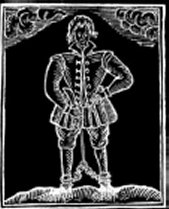The sixteenth century ended in England with political stormclouds gathering. The Queen was old, and couldn't last much longer. Who would take over when she was gone? Great men like Essex and Cecil engaged in power struggles. It was a tense time. On June 1, 1599 a rather edgy government began a crackdown on satire. In particular it issued a sweeping ban on all Nashe's works, past and to come, ordering the printers to burn existing stocks.
From that time on, as Nashe's biographer Charles Nicholl puts it, "Amid the smoke of the Elizabethan police state, Nashe begins to fade from view." The next mentions of him make it clear that he is dead. |
